人教版九年级英语unit 1 Section B
人教版英语九年级Unit1SectionB
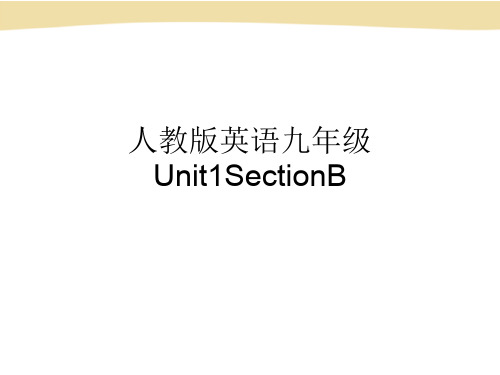
time.
1.对…有兴趣(2)
He is interested in keeping English diaries.
=He has an interest in keeping English diaries.
2. 关注..., 注意...
+doing
We must pay attention to protecting the environment.
Good learners think about(考虑,思考) what they are good
at and what they need to practice more.
理解句意:
Remember, “use it or lose it”! Even if(即使) you learn
something well, you will forget it unless you use it.
(2) do this-(3) whether or not --是否
whether she will come or not is still a problem. 她是否会来还是个问题。 (4) Depend on -- 视……而定,取决于;依靠;依赖
Research(研究) shows that successful learners have some good habits(习惯) in common.
Yes, I do. Because every day brings something new.
Listen carefully
How Can You Become a Successful(成功的) Learner?
success--n 成功 succeed-v 成功 successful-adj 成功的
人教新目标九年级英语全册Unit 1 Section B课件

Section B
4 make mistakes犯错;出错 [观察] I often make mistakes in grammar. 我经常在语法方面犯错。 [探究] make mistakes/make a mistake意为“犯错;出错”,表 示“在某方面犯错”要用make mistakes/a mistake _i_n__ sth.。
Section B
活学活用 请将这些导线和电池的引线连接起来。 Please __c_o_n_n_e_c_t __ these wires __w__it_h__ the leads of the battery.
Section B
句型透视
1 I don't know how to increase my reading speed. 我不知道如何提高我的阅读速度。 [探究] 本句中的how to increase my reading speed属于“特殊 疑问词+___动__词__不__定__式_____”的复合结构,在句中作动词know 的__宾__语。
Section B
活学活用 改为同义句 We want to know how we can study well. We want to know _h_o_w___ _t_o__ study well. [解析] 特殊疑问词接不定式短语作know的宾语,相当于一个 宾语从句;当主句主语与宾语从句主语一致时,可将带有特 殊疑问词的宾语从句改为“特殊疑问词+动词不定式短语” 结构。
人民教育出版社
授课教师:
九年级全册 · 课文
精品教学课件
学校:
Section B
词汇点睛
1 ability n. 能力;才能 [观察] Everyone is born with the ability to learn. 每个人天生都具有学习的能力。 [探究] ability是名词,have the ability ___to__d_o__ sth. 意为“有能力做某事”。 [拓展] 同根词:able adj.能的;有能力的
人教版英语九年级全册Unit1 SectionB(3a-Self Check)精品教案
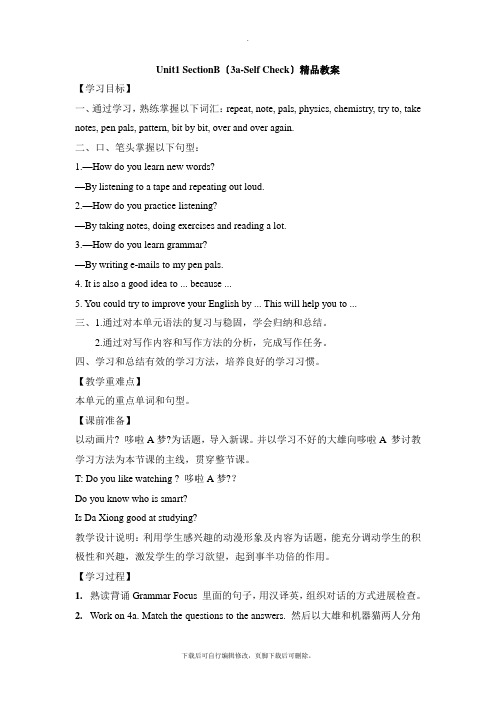
Unit1 SectionB〔3a-Self Check〕精品教案【学习目标】一、通过学习,熟练掌握以下词汇:repeat, note, pals, physics, chemistry, try to, take notes, pen pals, pattern, bit by bit, over and over again.二、口、笔头掌握以下句型:1.—How do you learn new words?—By listening to a tape and repeating out loud.2.—How do you practice listening?—By taking notes, doing exercises and reading a lot.3.—How do you learn grammar?—By writing e-mails to my pen pals.4. It is also a good idea to ... because ...5. You could try to improve your English by ... This will help you to ...三、1.通过对本单元语法的复习与稳固,学会归纳和总结。
2.通过对写作内容和写作方法的分析,完成写作任务。
四、学习和总结有效的学习方法,培养良好的学习习惯。
【教学重难点】本单元的重点单词和句型。
【课前准备】以动画片? 哆啦A梦?为话题,导入新课。
并以学习不好的大雄向哆啦A 梦讨教学习方法为本节课的主线,贯穿整节课。
T: Do you like watching ? 哆啦A梦??Do you know who is smart?Is Da Xiong good at studying?教学设计说明:利用学生感兴趣的动漫形象及内容为话题,能充分调动学生的积极性和兴趣,激发学生的学习欲望,起到事半功倍的作用。
九年级英语Unit1Section B 2a-2e

try to find out the answers. Knowledge comes from questioning. Learning is a lifelong journey because every day brings something new. Everything that you learn becomes a part of you and changes you, so learn wisely and learn well.
Connect what they need to learn with something interesting.
Example?
They need to learn English and they like music or sports.
so
so They can listen to English songs or
出处 Para.1“But whether or not you can do … depends on your learning habits.”
2. How can a sports lover learn English? A. By listening to English songs to learn English. B. By watching sports programs in English. C. By joining more sports clubs. D. By memorizing more words about sports.
I can’t pronounce some of the words.
I think you can ask the teacher or classmates for help. Listening to the tapes and repeating may help you a lot.
人教版英语九年级上册课件:Unit 1 Section B. ppt

3. What are successful learners’ (1h)aCbrietast?ing an interesting in what they learn
and answer the question.
Which four habits of successful learners
arCermeaetinngtiaonniendte?rest in what they learn.
Practicing and learning from mistakes.
new words I learned that day.
6. Learning a new language also helps us to gain some knowledge of the culture of its native speakers.
7. Scientists believe that only humans have the ability to learn a complex language.
also not get bored.
3. Use it or lose it: If you stop doing something,
you will forget how to do it. Practice makes perfect: If you do 4so. mThetehyinlegarn from mistakes, and they are not agaafirnaiadnodfamgaaikni,nygomu iwstiallkbeesc. ome very good at it. 5. Take notes by writing down key words or by drawing mind maps. Look for ways to review what has been learnt, e.g. read the notes ever day or explain the information to another student. 6. (Answers will vary.)
人教版九年级英语上册:Unit 1 Section B (1a-1e)

Thanks, Ms. Manson.
1e
Role--play conversations using the information in 1c and 1d.
A:I don’t have a partner to practice English with. B:Maybe you should join an English club.
知识点 1 increase /ɪn'kriːs/ v.增加;增长
考向一 increase可用作及物动词,也可用作不及物动词, 意为“增加;增长”。 eg:Eating too much fried food can increase the risk of cancer. 吃太多的 油炸食品会增加得癌症的风险。
Ms. Manson: Why don’t you join an English language club
to practice speaking English? The English club
meets after school on Tuesdays and Thursdays.
Paul:
知识点 2 speed/ spiːd/ n.速度 eg:Safety is more important than speed.
安全比速度更重要。 考向 常用搭配
at a/the speed of
以……的速度
at high/low/full speed
以高速/ 低速/ 全速
speed up 动词词组
can even study on the subway on the way to school.
Paul:
That might really help! Thayou understand when people talk to you?
人教版九年级上册英语Unit 1 背记手册 Section B 附答案
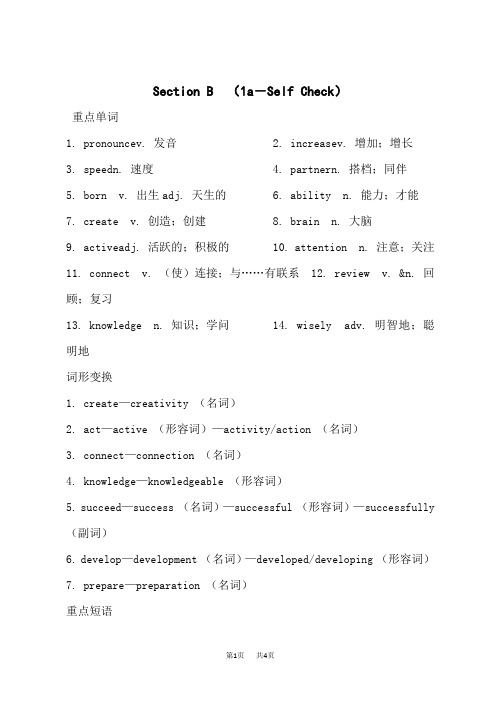
Section B (1a-Self Check)重点单词1. pronouncev. 发音2. increasev. 增加;增长3. speedn. 速度4. partnern. 搭档;同伴5. born v. 出生adj. 天生的6. ability n. 能力;才能7. create v. 创造;创建8. brain n. 大脑9. activeadj. 活跃的;积极的10. attention n. 注意;关注11. connect v. (使)连接;与……有联系12. review v. &n. 回顾;复习13. knowledge n. 知识;学问14. wisely adv. 明智地;聪明地词形变换1. create—creativity (名词)2. act—active (形容词)—activity/action (名词)3. connect—connection (名词)4. knowledge—knowledgeable (形容词)5. succeed—success (名词)—successful (形容词)—successfully (副词)6. develop—development (名词)—developed/developing (形容词)7. prepare—preparation (名词)重点短语1. make mistakes 犯错误2. have trouble (in) doing sth. 做某事有困难3. review…from time to time 不时地复习4. explainsth. to sb. 向某人解释某事5. be interested in对……感兴趣6. have… in common 在……有共同点7. find out 查明8. agree with sb. 同意某人的观点9. connect…with 把……和……连接或联系起来10. at once马上重点句型1. I don't know how to increase my reading speed. 我不知道怎样提高我的阅读速度。
人教版九年级上册英语Unit1SectionB部分课文翻译

⼈教版九年级上册英语Unit1SectionB部分课⽂翻译 英语的学习离不开翻译,关于⼈教版九年级上册英语Unit1 SectionB的部分课⽂的翻译有哪些呢?接下来是店铺为⼤家带来的关于⼈教版九年级上册英语Unit1 SectionB部分课⽂的翻译,希望会给⼤家带来帮助。
⼈教版九年级上册英语Unit1 SectionB:2a 部分课⽂翻译 What good learning habits can you think of? Make a list and discuss them with your partner. 你能想到什么好的学习习惯?制作⼀张列表并和你的搭档讨论它们。
⼈教版九年级上册英语Unit1 SectionB:2b 部分课⽂翻译 Read the passage quickly and check if any of the habits you listed in 2a are mentioned. Which four habits of successful learners can you find from the passage? 快速读这篇⽂章,检查⼀下是否提到了你在2a中列出的习惯。
从这篇⽂章中你能找到成功的学习者的哪四个习惯? USING DICTIONARIES This can help you find the definition that matches the context of the word in the text. 这能帮助你找到与课⽂中单词的上下⽂相配的释义。
How Can You Become a Successful Learner? 你如何成为⼀名成功的学习者? Everyone is born with the ability to learn. But whether or not you can do this well depends on your learning habits. Research shows that successful learners have some good habits in common. 每个⼈学习的能⼒与⽣俱来,但是你能否做好取决于你的学习习惯。
人教版九年级英语全一册知识梳理第一单元《Unit 1 Section B》
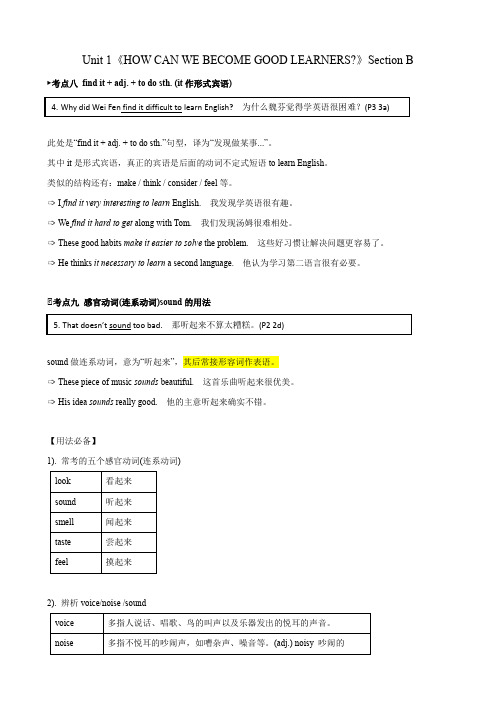
Unit 1《HOW CAN WE BECOME GOOD LEARNERS?》Section B▶考点八 find it + adj. + to do sth. (it 作形式宾语)此处是“find it + adj. + to do sth.”句型,译为“发现做某事...”。
其中it 是形式宾语,真正的宾语是后面的动词不定式短语to learn English 。
类似的结构还有:make / think / consider / feel 等。
➩ I find it very interesting to learn English. 我发现学英语很有趣。
➩ We find it hard to get along with Tom. 我们发现汤姆很难相处。
➩ These good habits make it easier to solve the problem. 这些好习惯让解决问题更容易了。
➩ He thinks it necessary to learn a second language. 他认为学习第二语言很有必要。
▶考点九 感官动词(连系动词)sound 的用法sound 做连系动词,意为“听起来”,其后常接形容词作表语。
➩ These piece of music sounds beautiful. 这首乐曲听起来很优美。
➩ His idea sounds really good. 他的主意听起来确实不错。
【用法必备】1). 常考的五个感官动词(连系动词)2). 辨析voice/noise /sound▶考点十 word by word 的用法word by word 意为“逐字地;一个词一个词地,”是一个副词性短语。
其中介词by 表示连续反复,意为“(一个)接着(一个);(一个)又(一个)”。
➩ It’s not a good habit to read word by word. 逐字阅读不是个好习惯。
人教版九年级上册英语Unit1SectionB部分课文翻译.doc

人教版九年级上册英语Unit1SectionB部分课文翻译人教版九年级上册英语Unit1SectionB部分课文翻译人教版九年级上册英语Unit1 SectionB:2a 部分课文翻译What good learning habits can you think of? Make a list and discuss them with your partner.你能想到什么好的学习习惯?制作一张列表并和你的搭档讨论它们。
人教版九年级上册英语Unit1 SectionB:2b 部分课文翻译Read the passage quickly and check if any of the habits you listed in 2a are mentioned. Which four habits of successful learners can you find from the passage?快速读这篇文章,检查一下是否提到了你在2a中列出的习惯。
从这篇文章中你能找到成功的学习者的哪四个习惯?USING DICTIONARIESThis can help you find the definition that matches the context of the word in the text.这能帮助你找到与课文中单词的上下文相配的释义。
How Can You Become a Successful Learner?你如何成为一名成功的学习者?Everyone is born with the ability to learn. But whether or not you can do this well depends on your learning habits. Research shows that successful learners have some good habits in common.每个人学习的能力与生俱来,但是你能否做好取决于你的学习习惯。
人教版英语九年级全册Unit1 SectionB(2a-Self Check)名师教案

Unit1 SectionB〔2a-Self Check〕名师教案【教材版本与册数】新目标人教版九年级全一册【单元名称】Unit 1 How can we become good learners?【课时】Section B 2a-Self Check〔第5课时〕【课型】Reading and Writing〔读写课〕【本课时教学设计】附:教学活动设计DELC5 2获取新知识Step2Pre-reading(5mins)2a What good learning habits can you think of?Make a list and discuss them with your partner.Being careful in class.Having an interest in the subject.Preparing before class.Reviewing after class.Asking questions in class or after class.Having a study partner.利用讨论好的学习习惯,涉及到阅读中的的内容,为后面的阅读文本奠定根底。
局部学生应该能利用此策略获取有效信息.Step 3 Whil e-rea ding (15 mins ) 1. Fast-reading2b Read quickly. Which four habits of successfullearners are mentioned?Creating an interest in what they learnPracticing and learning from mistakesDeveloping their study skillsAsking questions2.Careful-reading2c Read the passage again and answer the questions.1)Does the writer think that everyone is born withthe ability to learn well? Do you agree? Why or Whynot?2)Why is it a good idea to connect something youneed to learn with something you are interested in?3)What do the sayings〞Use it or lose it〞and〞Practice makes perfect〞mean? Do you agree withthem?4)Do good learners learn from mistakes or are theyafraid of making mistakes?5)What study skills does the writer talk about? Do1.培养学生快速阅读,掌握文章大意的阅读技巧。
人教版九年级英语 Unit 1 Section B(1a-2e)课件

at and what they need to practice more. Remember, “use it or lose it”! Even if you learn something well, you will forget it unless you use it. “Practice makes perfect.” Good learners will keep practicing what they have learned, and they are not afraid of making mistakes. Alexander Graham Bell did not invent the telephone overnight. He succeeded by trying many times and learning
Creating an interest in what they learn
it is also easier for you to pay attention to it for a long time. Good learners often connect what they need to learn with something interesting. For example, if they need to learn English and they like music or sports, they can listen to English songs or watch sports programs in English. This way they will not get bored.
人教版英语九年级全册Unit1 SectionB 课文重难点讲解
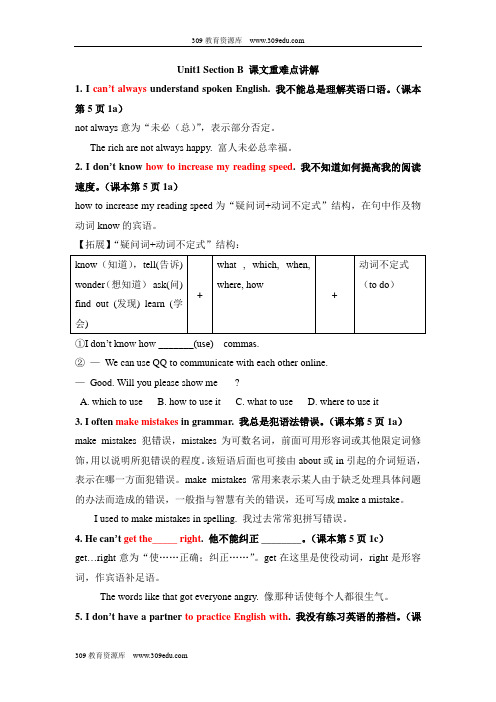
Unit1 Section B 课文重难点讲解1. I can’t always understand spoken English. 我不能总是理解英语口语。
(课本第5页1a)not always意为“未必(总)”,表示部分否定。
The rich are not always happy. 富人未必总幸福。
2. I don’t know how to increase my reading speed. 我不知道如何提高我的阅读速度。
(课本第5页1a)how to increase my reading speed为“疑问词+动词不定式”结构,在句中作及物动词know的宾语。
【拓展】“疑问词+动词不定式”结构:①I don’t know how _______(use) commas.②—We can use QQ to communicate with each other online.—Good. Will you please show me ___?A. which to useB. how to use itC. what to useD. where to use it3. I often make mistakes in grammar. 我总是犯语法错误。
(课本第5页1a)make mistakes 犯错误,mistakes为可数名词,前面可用形容词或其他限定词修饰,用以说明所犯错误的程度。
该短语后面也可接由about或in引起的介词短语,表示在哪一方面犯错误。
make mistakes常用来表示某人由于缺乏处理具体问题的办法而造成的错误,一般指与智慧有关的错误,还可写成 make a mistake。
I used to make mistakes in spelling. 我过去常常犯拼写错误。
4. He can’t get the_____ right. 他不能纠正 ________。
人教版九年级英语Unit1 Section B(3a~3b)教案
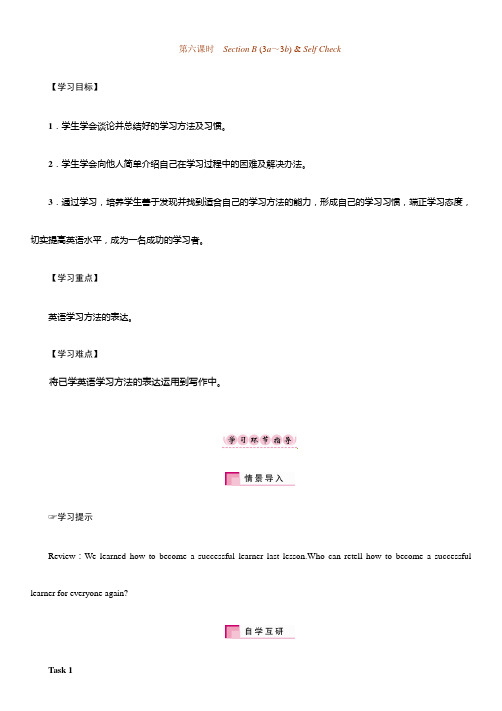
第六课时Section B (3a~3b) & Self Check【学习目标】1.学生学会谈论并总结好的学习方法及习惯。
2.学生学会向他人简单介绍自己在学习过程中的困难及解决办法。
3.通过学习,培养学生善于发现并找到适合自己的学习方法的能力,形成自己的学习习惯,端正学习态度,切实提高英语水平,成为一名成功的学习者。
【学习重点】英语学习方法的表达。
【学习难点】将已学英语学习方法的表达运用到写作中。
☞学习提示Review:We learned how to become a successful learner last lesson.Who can retell how to become a successful learner for everyone again?Task 1☞学习提示Review the words,phrases and sentences this unit and preview the words on P7-8.Students read the words by phonetic symbols and mark the new words and Chinese meaning in the text.Then finish the chart in 3a.【学法指导】►remember to do sth./remember doing sth.①remember to do sth.记得去做某事(未做)②remember doing sth.记得做过某事(已做)►worry about意为“为……而担忧”,还可以用be worried about来替换。
►instead of/instead①instead of意为“代替;而不是”,是介词短语,其后跟名词、代词或动名词作宾语,表示被代替的人或事物。
②instead是副词,意为“代替;反而”,可单独使用,在句中作状语,常位于句末;若位于句首,常用逗号将其与后面的内容隔开。
人教版九年级英语第一单元Unit 1 section B 知识点精讲

人教版九年级英语第一单元Unit 1 section B 知识点精讲SectionB单词1. increase /ɪn'kri:s/ v.增加;增长助记in(prep.在……里面)+ crease(v.弄皱)=increase 【拆分记忆法】典例The population continues to increase.人口持续增长。
短语increase to增加到2. speed /spi:d/ n.速度典例The train is travelling at a speed of sixty miles an hour.火车正以每小时60英里的速度行驶。
短语at a speed of.…以…的速度谚语Fool's haste is no speed.欲速则不达。
3. born /bɔ:(r)n/ v.出生adj.天生的典例He was born in 1990.(动词)他出生于1990年。
He is a born leader.(形容词)他是一个天生的领袖。
联想bear(原形:生育)→bore(过去式)→born(过去分词)4. ability /ə'bɪləti/ n.能力;才能助记a/ə/ + bi/bɪ/ + li/lə/ + ty/ti/= ability 【音标记忆法】典例I have never doubted about her ability.我从未怀疑过她的能力。
a man of great musical ability一个有卓越音乐才能的人短语have the ability to do sth有能力做某事联想able adj.有能力的5. create /kri'eɪt/ v.创造;创建助记cre+ate(eat的过去式)= create 【拆分记忆法】典例You should create a healthy meal plan for yourself.你应该为你自己创建一个健康的饮食计划。
人教版九年级英语上册课件Unit1SectionB第一课时

Listen and fill in the blanks.
Paul _l_o_o_k_s _w_o_r_r_i_e_d_ because he is having _tr_o_u_b__le_ _le_a_r_n_i_n_gEnglish. First he can’t get the pronunciation right. Then he can’t remember the new words and sometimes he can’t understand what people are saying in English. And he doesn’t get much _w_r_i_ti_n_g_ _p_r_a_c_t_ic_e_.
people talk to him. 4. He doesn’t get much __w_r_i_ti_n_g___
practice.
1d Listen again. Complete the solutions.
Solutions 1. _L_i_s_te_n_i_n_g__ can help. 2. He can always _w_r_i_te__th_e__n_e_w__w_o_r_d_s_ in his
Presentation: Free Talk
What things are difficult for you in learning English?
I can’t pronounce some of the words.
I can’t always understand spoken English.
Unit 1 How can we become good
learners?
人教版九年级英语第一单元Section B
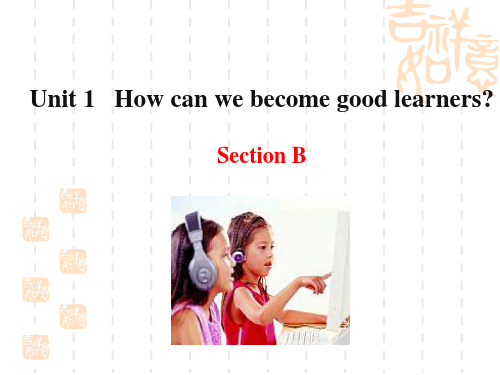
keep doing sth.
坚持干某事
be afraid of doing sth. make mistakes take notes write down key words draw mind map Use it or lose it. Practice makes perfect. Knowledge comes from questioning.
1e PAIRWORK Role-play conversations using the information in 1c and 1d. A: I don’t have a partner to practice English with. B: Maybe you should join an English club.
Unit 1 How can we become good learners?
Section B
Lead in
Questions about learning English. How long have you learned English? Do you like learning English? Are you good at learning English? What difficulties do you have in learning English?
depend on
依靠;依赖
have ...in common
有……共同点
be interested in be born with
对……感兴趣 天生具有
pay attention to
注意;关注
connect...with
把……和……连接或联系起来
人教版九年级第一单元SectionB
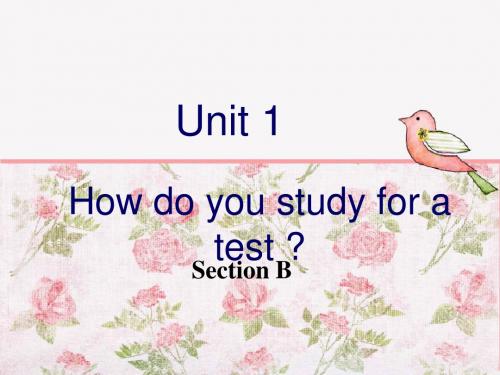
b. 5 You should find a pen pal.
c. 1 Listening can help. •
3 Why don’t you join an English language
club to practice speaking English?
2c.Pairwork Example A: I don’t have a partner to practice English with. B: Maybe you should join an English language club.
I read very slowly.
1b What other things are difficult for you? Make a list. 1.I don’t know how to use commas. 2. ____________________________
3. ____________________________
3a Read the article. Then read the statements about the article. Write “T”(for true) or “F”(for How I learned to learn English false). Last year my English class was difficult for me. First of all, it wasn’t easy for me to understand the teacher when she talked to the class. To begin with, she spoke too quickly, and I couldn’t understand every word. Later on, I realized that it doesn’t matter if you don’t understand every word. Also I was afraid to speak in class, because I thought my classmate might laugh at me.I couldn’t always 0 first of all 首先;第一 make complete sentences, either. at sb笑话;取笑(某人) laugh later on 以后;随后 complete adj. 完整的;完全的 be afraid to do sth害怕去做… sentence n. 句子 be afraid of sth/doing sth make a sentence 造句 be afraid+that引导的从句
- 1、下载文档前请自行甄别文档内容的完整性,平台不提供额外的编辑、内容补充、找答案等附加服务。
- 2、"仅部分预览"的文档,不可在线预览部分如存在完整性等问题,可反馈申请退款(可完整预览的文档不适用该条件!)。
- 3、如文档侵犯您的权益,请联系客服反馈,我们会尽快为您处理(人工客服工作时间:9:00-18:30)。
A Healthy Lifestyle
.
29
How to keep healthy?
A healthy diet Exercise Sleep well ….
.
23
Tapescript
K: Oh, I love milk — I drink it every day.
R: What about junk food? How often do you eat it?
B: I love junk food — I eat it three or four times a week.
2. __a___ milk 5.__f___sleep
4. __c__ vegetables 6. __d__ coffee
.
18
a
b
c
d
e
f
.
19
1b Pairwork
A: How often do you drink milk, Liu Fang? B: I drink milk every day. A: Do you like it? B: No. But my mother wants me to drink it.
.
1
.
2
Words & Expressions
junk
废弃的旧物;破烂物
junk food 垃圾食品
milk
牛奶
coffee 咖啡
chip
(食物等的) 薄片
cola
可乐
.
3
Words & Expressions
chocolate drink health how many interviewer
K: I never drink coffee. R: Well, thank you very much. B/K: You’re welcome.
.
25
2b Listen, write and speak.
How often does…? Katrina
exercise
every day
eat vegetables
B: I sometimes eat vegetables.But I never eat fruit. I don’t like it.
R: All right. So how many hours do you sleep every night?
K: Nine. I need lots of sleep. B: Same. Nine. I need lots of sleep. R: How often do you drink milk? B: Never. I can’t stand milk. It’s awful.
She says it’s good for my health.
.
20
2A Listen. Circle your answer to each question.
Is Bill healthy? Yes. No. I don’t know.
Is Katrina healthy? Yes. No. I don’t know.
eggplants a piece of cheese mushrooms
.
10
a pineapple
grapes
strawberries a kiwi fruit
lemons
What drinks would you like?
.
12
milk
Cola
orange juice
tea
.
13
junk food
every day
never
2 or 3 times a week
never
3 or 4 times a week
4 times a week
.
27
2c. Pairwork
How often do you exercise?
And how often do you …?
.
I exercise every day.
10 or 11 times a week
Bill hardly ever sometimes
eat fruit
every day
never
.
26
How many hours …sleep?
drink milk
eat junk food
drink coffee
nine hours nine hours
cola
.
14
Is the food in the following pictures healthy or unhealthy?
.
15
unhealthy food
.
16
healthy
food
.
17
1a
Match the words with the pictures.
1.__b__ junk food 3. __e__ fruit
K: Yeah, I love it, too. I guess I eat it two or three times a week.
R: And coffee? How often do you drink
coffee?
.
24
Tapescript
B: Oh, I drink coffee four times a day. I love coffee.
.
21
Tapescript
R = Reporter; K = Katrina; B = Bill
R: Thanks for coming in for the interview,
Katrina.
K: That’s OK. This is Bill. You can
interview him, too.
R: OK, then, so, um, how often do you
exercise?
K: Every day.
B: Hardly ever.
R: Uh-huh. How often do you eat
vegetables and fruit?
.
22
Tapescript
K: I eat vegetables every day and I eat fruit every day.
巧克力 喝;饮 健康;健康状况 多少 采访者
.
4
New words
milk
coffee
.
5
Junk food
chips
hamburger
.
6
cola
chocolate
.
7
vegetables
fruit
.
8
What are they?
.
9
tomatoes green peppers
onions
